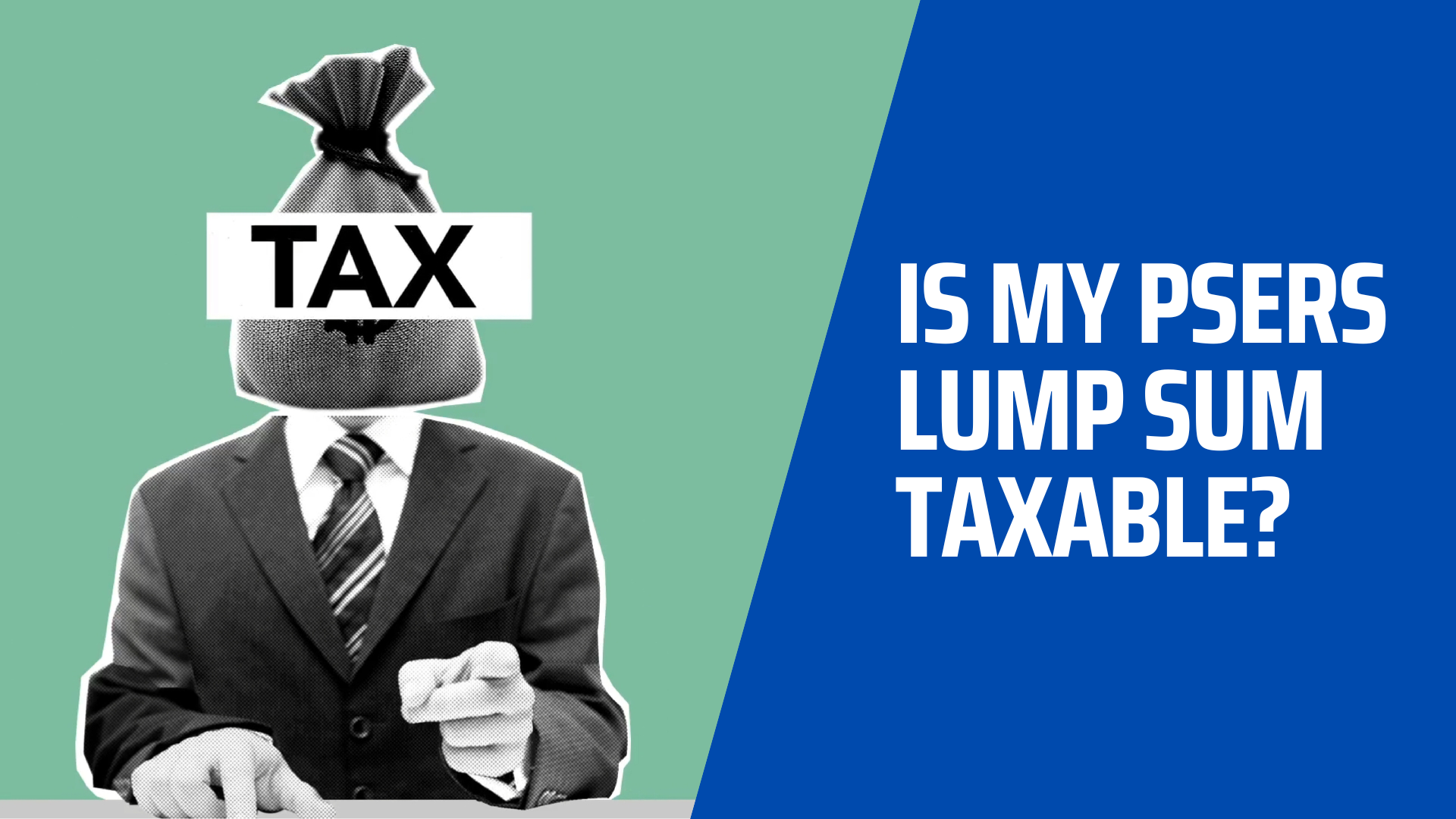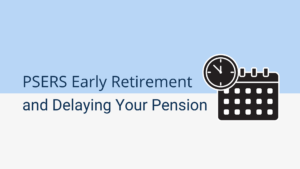*TeachersRetire is not affiliated with, endorsed or sponsored by PSERS*
Make sure to read Part 1 of this article too!- Click Here to Read
To help make your retirement easy and low stress, let’s explore two common mistakes made by PSERS members as they approach retirement and how you can avoid them.
Mistake #1- Turning Your Lump Sum Withdraw into a Taxable Event
When filling out your PSERS Retirement Application, you will choose how to handle your contributions and interest (also known as a lump sum). Your contributions and interest is the money you have contributed from each paycheck (likely 7.5% of your pay) and the interest by which it has accumulated over your years of service. You can find a snapshot of your contributions and interest on Page 2 of your PSERS Statement of Account or in your Member Self-Service Portal.
At retirement, you will choose between one of the following options:
- Leave your contributions and interest in PSERS
- Withdraw your contributions and interest in a lump sum
Leaving your money in PSERS means you no longer have access to it. In return, PSERS will give you your full pension payment each month.
Withdrawing your contributions and interest means you will take that money out of the PSERS retirement system. The trade off is that PSERS will lower your pension payment accordingly. The impact on your monthly payment is shown on your PSERS Retirement Benefit Estimate and on the benefits calculator in your member portal.
If you choose to withdraw your money in a lump sum, you need to make sure it doesn’t turn into a tax disaster. This can happen if you choose to have the lump sum payment made directly to you. Since this money is likely 100% taxable as income, withdrawing it could significantly increase your taxable income the year you retire. This could bump you up one or more tax brackets and you could be in for a very large tax bill from the IRS.
Let’s take a look at an example of how this can play out if handled incorrectly:
Bob is retiring this year. His salary is $70,000. His wife works part-time and is paid $30,000. This means their gross income is $100,000. They will take the standard deduction of $25,900 in 2022 which means their taxable income is $74,100.
2022 Income Tax Brackets for Married Filing Joint
| Tax Rate | Income Range |
| 10% | $0 – $20,550 |
| 12% | $20,551 – $83,550 |
| 22% | $83,551 – $178,150 |
| 24% | $178,151 – $340,100 |
At $74,100 of taxable income, Bob and his wife will be in the 12% tax bracket. If he decides to withdraw his $150,000 lump sum, their taxable income will be $224,100 ($74,100 + $150,000) and they will jump all the way up to the 24% bracket. That could be a very painful tax bill for Bob! This probably wasn’t what he had in mind.
What should I do instead?
To avoid this potential tax issue, you can choose to have your lump sum payment rolled directly into a pre-tax retirement account like an IRA. As long as the entire amount goes directly into your IRA and never touches your hands, the transaction should be tax-free. Once the funds are in your IRA, you can invest them however you would like and make withdrawals as needed. Keep in mind that the money you eventually withdraw from the IRA is taxable.
Mistake #2- Making PSERS Retirement and Pension Decisions at Exit Counseling
All PSERS members are highly encouraged to attend Exit Counseling before retirement. These sessions can help you better understand your pension benefits and options, other important topics like health coverage through the PSERS Health Options Program (HOP) and buying back service credit.
However, making your pension choices at your Exit Counseling session is not advisable for a few reasons:
Reason #1
The PSERS representative at the session can only provide general information, not advice. This means that you typically can’t get answers to your big PSERS retirement questions like:
- Which pension option is best for me?
- Should I withdraw my contributions and interest?
- If so, where should the lump sum money go?
- Which health insurance option should I choose?
- What’s the best way for me to buy back eligible service credit?
These are really important questions and you need concrete answers before completing and submitting your retirement application.
Reason #2
You should make pension and retirement decisions carefully and while considering your whole financial picture.
Typically, Exit Counseling sessions are held in a small group format either online or in-person. This usually means there are lots of questions being asked of the PSERS representative. You might also be learning new information that pertains to your choices and benefits at the same time. This can make it difficult to incorporate all of the necessary factors into your pension choices while at Exit Counseling like:
- Will my spouse have enough income if I pass away in early retirement?
- How does my Social Security impact my pension choices?
- How much tax should I have withheld from my pension?
- If I leave my contributions and interest in PSERS, will I have enough liquid assets and investments in case my expenses go up?
- Should I choose a PSERS Health Options Program prescription drug plan?
Answering big questions like these require time, planning and potentially help from your CPA, insurance agent or financial planner. It’s easy to make mistakes when the details matter and you don’t have the right resources at your disposal at the time. Exit Counseling simply isn’t the right place to be bringing all of these decisions together.
What should I do instead?
Whether your PSERS retirement will be simple or complicated, you should be fully prepared before Exit Counseling. At a minimum, you should review and become familiar with your pension options. You can learn about the Maximum Single Life Annuity here, Option 1 here and Options 2 and 3 here.
You should also have decided how to handle your contributions and interest before Exit Counseling. If you’re withdrawing it and rolling the funds into an IRA, you’ll need to have the IRA set up and the information available to fill in Section 4 of the retirement application and the Authorization for Direct Rollover form.
To make your Exit Counseling experience easy and stress-free, we recommend filling out your retirement application before you attend with the help of your financial planner. This way, you won’t be making any last-minute decisions at the session and you’ll have less chances of making a mistake.



